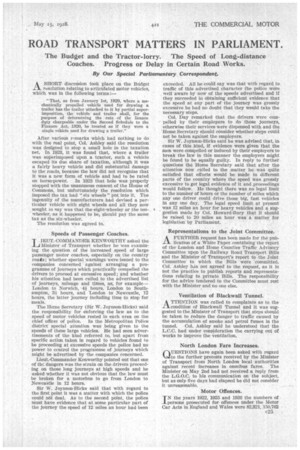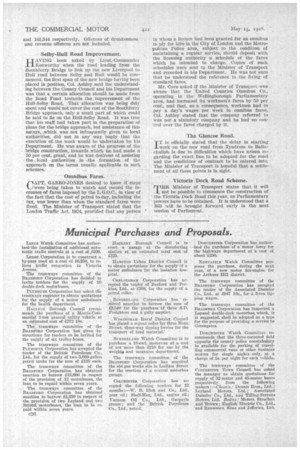ROAD TRANSPORT MATTERS IN PARLIAMENT.
Page 47

Page 48

If you've noticed an error in this article please click here to report it so we can fix it.
The Budget and the Tractor-lorry. The Speed of Long-distance Coaches. Progress or Delay in Certain Road Works.
By Our Special Parliamentary . Correspondent
SHORT discussion took place on the Bridget resolution relating to articulated motor vehicles, which was in the following terms :—
"That, as from January 1st, 1929, where a mechanically propelled vehicle used for drawing a trailer has the trailer attached to it by partial superimposition, the vehicle and trailer shall, for the purpose of determining the rate of the licence duty chargeable under the Second Schedule to the Finance Act, 1920, be treated -as if they were a single vehicle used for drawing a trailer."
After various remarks which had nothing to do with the real point, Col. Ashley said the resolution was designed to stop a small hole in the taxation net. In 1923, it was found that, where a trailer was superimposed upon a tractor, such a vehicle escaped its due share of taxation, although it was a fairly heavy vehicle and did substantial damage to the roads, because the law did not recognize that it was a new form of vehicle and had to be rated on horse-Power: In 1923 that hole was properly stopped with the unanimous consent of the House of Commons, but unfortunately the resolution which imposed the tax had "six wheels" put into it. The ingenuity of the manufacturers had devised a particular vehicle with eight wheels and all they now sought to say was that the eight-wheeler or the tenwheeler,. as it happened to be, should pay the same tax as the six-wheeler.
The resolution was agreed to.
Speeds of Passenger Coaches.
LIEUT.-COMMANDER KENWORTHY asked the Minister of Transport whether he was examining the question of the increased speed of large passenger motor coaches, especially on the country roads; whether special warnings were issued to the companies concerned against arranging a programme of journeys which practically compelled the drivers to proceed at excessive speed ; and whether his attention had been called to the advertised list of journeys, mileage and times, as; for example-London to Norwich, 4 hours, London to Southampton, 34 hours, and London to Newcastle, 12 hours, the latter journey including time to stop for meals.
The Home Secretary (Sir W. Joynson-Hicks)•said the responsibility for enforcing the law as to the speed of motor vehicles rested in each area on the chief officer of police. In the Metropolitan Police district special attention was being given to the speeds of these large vehicles. He had seen advertisements of the kind referred to, but apart from specific action taken in regard to vehicles found lo be proceeding at excessive speeds the police had no power to cuntrol the programme of journeys which might be advertised by the companies concerned.
Lieut.-Commander Kenworthy pointed out that one of thz dangers was the strain on the drivers proceeding on those long journeys at high speeds and he asked whether it was not obvious that the law must be broken for a motorbus to go from London to Newcastle in 12 hours.
Sir W. Joynson-Hicks said that with regard to the first point it was a matter with which the police could ant deal. As to the second point, the police Must have evidence that at some particular part of the journey the speed of 12 miles an hour had been exceeded. All he could say was that with regard to traffic of this advertised character the police were well aware by now of the speeds advertised and if they succeeded in obtaining sufficient evidence that the speed at any part of • the journey was grossly excessive he had no doubt that they would take the necessary steps.
Col. Day remarked that the drivers were compelled by their employers to do those journeys, otherwise their services were dispensed with and the 'Home. Secretary should censider whether steps could not be taken against the employers.
Sir W. Joynson-Hicks said he was advised that, in cases of this kind, if evidence were given that the men were contelled or induced by their employer's to break the law in this manner the employers might be Riund to be equally guilty. In reply to further questions the Home Secretary said that after. the attention now called to the matter he -was quite satisfied that efforts would be made in different parts Of the country where the speed was grossly excessive to get legal evidence of it and .proceedings would follow. He thought there was no legal limit to the number of hours or the number of miles which any one driver could drive those big, fast vehicles in any one day. The legal speed limit at present was 12 miles an hour for.heavy vehicles and a suggestion made by Col. Howard-Bury that it should be raised to 20 miles an hour was a matter for legiSlation by Parliam'ent.
Representations to the Joint Committee.
FURTHER request has been made for the publication of a White Paper:containing tbe repert of the-London and Home Counties Traffic Advisory Cominittee upon the -Railway Road Transport Bills and the Minister of Transport's report to the Joint Committee to which the Bills were 'committed. Col. Ashley has not agreed to the request, as it is not the practice to publish reports and representations relating to private Bills. The responsibility for the advice tendered to the Committee must rest with the Minister and no one else.
Ventilation of Blackwall Tunnel.
1-3A TTENTION was called to complaints as to the condition of Blackwell Tunnel and it was suggested to the Minister of Transport that steps should be taken to reduce the danger to traffic caused by the accumulation of smoke and petrol fumes in the tunnel. Col. Ashley said he understood that the L.C.C. had under consideration the carrying out of works to improve the ventilation,
North London Fare Increases.
QUESTIONS have again been asked with regard to the further protests received by the Minister of Transport from North London local authorities against recent increases in omnibus fares. The Minister on May 2nd had not received a reply from the L.G.O.C. to his communication on the subject, but as onlylive days had elapsed he did not consider it unreasonable.
Motor Offences.
IN the years 1922, 1925 and 1926 the numbers of persons prosecuted for offences under the Motor Car Acts in England and Wales were 82,321, 150,762 c25
• and 103,344 respectively. Offences of drunkenness and revenue offences are not included.
• Selby-Hull Road Improvement. • Selby-Hull Road Improvement. HAVING been asked by Lieut.-Commander Ke,nworthy when the road leading from the Boothferry Bridge to link up the new Liverpool to Hull road between Selby -and Hull would be commenced, the first span of the new bridge having been placed in position, Col. Ashley said the understanding between the County Council and his Department was that a certain allocation should be made from the Road Fund towards the improvement of the Hull-Selby Road. That allocation was being duly spent and would not cover the cost of the Boothferry Bridge approach, only a small part of which could be said to lie on the Hull-Selby Road. It was true that his staff had taken part in the preparation of plans for the bridge approach, but assistance of this nature, ;which was not infrequently given to local authorities, did not in any way imply that the execution of the work would be undertaken by his Department. He was aware of the progress of the bridge construction, towards which Ike hind made 50 per cent. grant, and he was desirous ot assisting the local authorities In the formation of the approach on the terms usually applicable to such
schemes. .
' Omnibus Fares.
GARRO-JONES desired to knew if steps L were being taken to watch and record the increases of fares imposed by the L.G.O.C., in view of the fact that the cost of petrol to-day, including the tax, was lower than when the standard fares were fixed. The Minister of Transport stated that the London Traffic Act, 1924, provided that any person
to whom a licence had been granted for an omnibus to ply for hire lathe City of London and the Metropolitan Police area, subject to the condition of maintaining a regular service, should deposit with the licensing authority a ached-ale of the fares which he intended to charge. Copies of such. schedules were sent to the Minister of Transport and recorded in his Department. He was not sure that he understood the reference to the fixing of standard fares.
• Mr. Cove asked if the Minister of Transport was aware that the United Counties Omnibus Co., • operating in the Wellingborough Parliamentary . area, had -increased its workmen's fares by 50 per cent., and that, as a consequence, workmen had to pay a day's wages per week in omnibus fares. Col. Ashley stated that the company referred to • was not a statutory company and he had no control over the fares charged by it.
The Glencoe Road.
IT is officially stated that the delay in starting work on the new road from Tyndrkun to Balla
• chulish is due to difficulties which have arisen re, • • garding the exact line to be adopted for the road and the conditions of contract to be entered into. . The Minister of Transport is honeful that a settlement of all these points is in sight.
Victoria Dock Road Scheme.
fl HE Minister of Transport States that it will not be -possible to commence the construction of the Victbria-Dock Road this year, as Parliamentary powers have to be obtained. It is understood that a Bill will be brought forward early in the next session of Parliament.












































































































